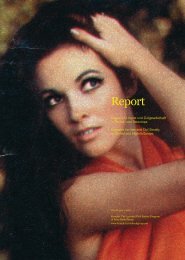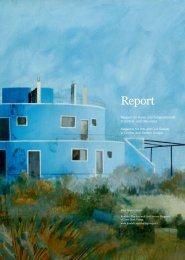Report_Issue 1/2009 - Jubiläum/ 20 Jahre Mauerfall
Report_Issue 1/2009 - Jubiläum/ 20 Jahre Mauerfall
Report_Issue 1/2009 - Jubiläum/ 20 Jahre Mauerfall
Erfolgreiche ePaper selbst erstellen
Machen Sie aus Ihren PDF Publikationen ein blätterbares Flipbook mit unserer einzigartigen Google optimierten e-Paper Software.
THE TRANZIT PROGRAM<br />
AUTUMN / WINTER <strong><strong>20</strong>09</strong><br />
tranzit.hu<br />
Exhibition: Typopass – Critical Design and conceptual<br />
Typography<br />
organized by tranzit.hu and Dorottya Gallery<br />
(Műcsarnok)<br />
Curators: Judit Angel, Dóra Hegyi, Zsuzsa László<br />
Participants: Andreas Fogarasi, Lajos Kassák, László<br />
Moholy-Nagy, Société Réaliste, Boris Ondreička,<br />
Katarina Šević, Mladen Stilinović, others and artists’<br />
publications<br />
How can we establish a critical design that is in opposition<br />
to the mainstream consumer culture and with<br />
ecological, geopolitical, and social consciousness does<br />
not simply serve client interest but aspires to shape<br />
actively visual culture, and society? Such an utopist<br />
approach to design first appeared at the beginning<br />
of the <strong>20</strong>th century in modernist movements, which<br />
questioned the ornamental function of design proposing<br />
a different concept of it that would serve social and<br />
political purposes. However, the new and revolutionary<br />
visual code introduced by modernism in time became a<br />
sheer stylistic feature of elegance and professionalism.<br />
In the 1960–70s the concept of anti-design emerged<br />
as an expression of critical attitude and underground<br />
spirit deliberately applying and appropriating amateur<br />
and rudimentary techniques. Today, design solutions<br />
created originally out of political and social engagement<br />
became freely exchangeable stylistic elements<br />
and marketing devices. Critical approach can typically<br />
be observed in the political decoding and reflected application<br />
of various visual languages.<br />
Typography as a visual language that can be interpreted<br />
both in the field of fine art and design is in the focus<br />
of the project. The exhibition presents historical and<br />
contemporary works, projects, and publications from<br />
the frontier design and art grouped along three topics:<br />
1 Typographic Utopia, 2 Anti-design, 3 Subversive<br />
design and typography typology.<br />
The exhibition and program series Typopass – critical<br />
design and conceptual typography is part of the<br />
international project Art Always Has Its Consequences<br />
supported by the Culture <strong>20</strong>07 Program of the European<br />
Union<br />
Duration: 14 October–27 November <strong><strong>20</strong>09</strong><br />
Sites: Budapest–Dorottya Gallery (Dorottya u. 8.),<br />
Labor (Képíró u 6.) 14 October–15 November <strong><strong>20</strong>09</strong>;<br />
Platán Gallery (Polish Institute, Andrássy út 32.)<br />
22 October–27 November <strong><strong>20</strong>09</strong><br />
Connected to the exhibition:<br />
14–15 October <strong><strong>20</strong>09</strong><br />
Free School for Art Theory and Practice<br />
with Société Réaliste, Márton Szentpéteri and others<br />
27–29 November <strong><strong>20</strong>09</strong><br />
Free School for Art Theory and Practice<br />
with terminal 2: Edit Molnár (Berlin-Budapest) and<br />
Aleya Hamza (Cairo)<br />
tranzit.blog.hu ongoing<br />
Visual culture online magazine in Hungarian<br />
Fall: launch of the English version<br />
Publication<br />
Interviews with lecturers of the Free School for Art<br />
Theory and Practice <strong>20</strong>06–<strong>20</strong>07<br />
tranzit.cz<br />
PUBLISHING PROGRAMME<br />
Stano Filko catalogue<br />
A catalogue of an important Slovak artist.<br />
Spring <strong>20</strong>10<br />
publisher tranzit.cz and JRP-Ringier<br />
Posters by post<br />
The poster medium, combined with the artist’s option<br />
of using one side as his or her catalogue, sent by post<br />
to a chosen group of galleries, curators, artists and<br />
other interested persons.<br />
Autumn issue: Zbyněk Baladrán (cz)<br />
TRANZITDISPLAY GALLERY<br />
Exhibition: A “Ladies Almanack*”<br />
Curators: Hedwig Saxenhuber (springerin, Vienna, at)<br />
Artists: Dorit Margreiter Ines Doujak Katrina Daschner<br />
In cooperation with tranzit.at and springerin Magazine<br />
(at)<br />
A “Ladies Almanack*” builds the parenthesis for the<br />
Prague exhibition of the three female artists. The title<br />
is borrowed from the famous book “Ladies Almanack”<br />
by Djuna Barnes about a predominant lesbian circle<br />
in Paris of the 19<strong>20</strong>s, full of obscure language, inside<br />
jokes and ambiguity<br />
The exhibited works by Dorit Margreiter, Ines Doujak<br />
and Katrina Daschner deal partly with lesbianism in<br />
different forms, but it is not the main theme of their<br />
works. Dorit Margreiter is interested in architecture,<br />
film (business) and representation, Katrina Daschner<br />
rewrote and transferred the famous novel “Lolita” by<br />
Vladimir Nabokov to a lesbian setting, and Ines Doujak<br />
dissolved the matrix of heteronormativity as the “normal”<br />
social order in her works. Each of these artistic<br />
positions deals with a specific theme, and while their<br />
art differs greatly, they all share a structural approach,<br />
which critically questions the orders determining social<br />
aspects of our lives, our culture and politics, focussing<br />
on gender aspects.<br />
Duration: 18 September–11 November <strong><strong>20</strong>09</strong><br />
tranzitdisplay<br />
Dittrichova 9/337, Prague 2, 1<strong>20</strong>00, CZ<br />
———<br />
Exhibition: Who is student?<br />
Curators: Václav Magid, Vasil Artamonov (cz)<br />
A project of Václav Magid, Czech young artist and<br />
curator; regarding student’s identity and its history.<br />
The Exhibition deals with the anniversary of the Velvet<br />
Revolution in November 1989. In cooperation with The<br />
Student Council.<br />
Duration: 08 Dezember <strong><strong>20</strong>09</strong>–31 January <strong>20</strong>10<br />
Lectures and discussions: November–December <strong><strong>20</strong>09</strong><br />
A long-term series of lectures, discussions and round<br />
tables are going on in <strong><strong>20</strong>09</strong>. Participants: theoreticians,<br />
curators, artists and other guests.<br />
tranzitdisplay<br />
Dittrichova 9/337, Prague 2, 1<strong>20</strong>00, CZ<br />
———<br />
Exhibition: Sung Hwan Kim Exhibition<br />
Solo show of Sung Hwan Kim (b. 1975, Seoul). In his<br />
practice, the artist integrates video and performance<br />
art, taking on the role of director, editor, performer,<br />
composer, narrator and poet. By approaching his own<br />
work from all production angles, his pieces are infused<br />
with his own highly subjective vision.<br />
Duration: 23 February <strong>20</strong>10–09 May <strong>20</strong>10<br />
tranzitdisplay<br />
Dittrichova 9/337, Prague 2, 1<strong>20</strong>00, CZ<br />
———<br />
Workshop: Radio d-cz<br />
One-week radio workshop in tranzitdisplay, including<br />
a series of discussions and lectures on broadcasting<br />
internet projects.<br />
The broadcasting stations in Germany and Czech Republic<br />
invite specialists from both countries to curate<br />
five radio art works for five independent “radio-spaces”,<br />
in tranzitdisplay. These artworks will then be broadcast<br />
by public radio stations in both countries.<br />
In cooperation with Gaby Hartel (d), Frank Kaspar (d),<br />
Michal Rataj (cz) and Miloš Vojtěchovský (cz).<br />
Support Kulturstiftung des Bundes (d).<br />
Duration: 16–22 November <strong><strong>20</strong>09</strong><br />
tranzitdisplay<br />
Dittrichova 9/337, Prague 2, 1<strong>20</strong>00, CZ<br />
tranzit.sk<br />
Exhibition: LOIS & FRANZISKA WEINBERGER<br />
at tranzit workshops and around<br />
Duration: 01 October–21 November <strong><strong>20</strong>09</strong><br />
at tranzit workshops and around<br />
tranzit workshops<br />
Studená 12, Bratislava–Zlaté Piesky, Slovak Republic<br />
open from wednesday to saturday, 3 to 6 pm<br />
tranzit.at<br />
PROJECT UKRAINE<br />
Art + Knowledge_2, NOVEMBER <strong><strong>20</strong>09</strong><br />
Revolution?, FEBRUARY <strong>20</strong>10<br />
Cooperation between Visual Culture Research Center<br />
National University of Kiev-Mohyla Academy<br />
(NaUKMA) and tranzit.at<br />
Located in the former space of the Soros Contemporary<br />
Art Centre in Kyiv at the National University of Kyiv-<br />
Mohyla Academy, the Visual Culture Research Center is<br />
an initiative in an academic frame. Involving the faculty<br />
and students of the cultural studies department in<br />
collaboration with international researchers, curators,<br />
critics and artists in the form of working seminars,<br />
conferences, residences and exhibitions, the Center<br />
is intended as an innovative platform to integrate<br />
current artistic practice and academic disciplines. The<br />
aim of the Center is to develop an environment that<br />
promotes the analysis of manifestations in post-Soviet<br />
cultural, political, and economic situations evident and<br />
particular to Ukraine. With a focus on issues relevant to<br />
interpreting the concrete historical circumstance, the<br />
primary objective of the Centre is to generate a format<br />
for the production of discourse.<br />
The program includes:<br />
– Series of lectures by researchers, artists, critics<br />
and curators<br />
www<br />
.tranzit<br />
.org<br />
Here you will find further information<br />
on projects by tranzit in Austria,<br />
Hungary, Slovakia and the Czech<br />
Republic.<br />
– Visual Laboratory<br />
– A regular presentation and discussion of the<br />
academic/field research<br />
– Video screenings and eventually art exhibitions<br />
introducing international positions related to the<br />
themes approached<br />
– Conferences / Seminars<br />
SWEET SIXTIES<br />
Ongoing research project, next public events at the<br />
Ashkalawan Festival Beirut, APRIL <strong>20</strong>10<br />
Sweet Sixties is a long term experimental curatorial,<br />
scientific and educational research project that<br />
investigates hidden territories of the revolutionary<br />
period of the 1960s regarded from contemporary<br />
artistic and theoretical perspectives. The curatorial<br />
and artistic focus lies on “post ideological societies” (in<br />
post-Soviet, post socialistic, Eastern European, Middle<br />
Eastern, West and Central Asian as well as North<br />
African countries and in a second phase in China and<br />
Latin America) and is making a comparative analysis<br />
and contextualization of the historical developments<br />
in arts, culture and society of the 1960s and 70s and<br />
their subsequent effects on contemporary socio-political<br />
and cultural situations.<br />
Project researchers are: Nancy Adajania (University<br />
of Delhi), India; Ali Akay (art critic, Mimar Sinan<br />
University) Turkey; Janane al-Ani (curator and writer,<br />
Baghdad) Irak; Ruben Arevshatyan (artist, independent<br />
curator, Armenian Open University) Armenia; Olga<br />
Bryukhovetska (Visual Culture Research Center,<br />
Kyiv) Ukraine; Keti Chukrov (Lomonossov University,<br />
Moscow) Russia; Daho Djerbal (University of Algiers),<br />
Algeria; Galit Eliat (Israeli Center for Media Art, Tel<br />
Aviv) Israel; Tom Holert (Academy of Fine Arts, Vienna)<br />
Germany/Austria; Ulan Japarov (art historian and<br />
architect, Bishkek), Kirgistan; Vaisf Kortun (Platform<br />
Garanti Contemporary Art Center) Istanbul, Turkey; Iliko<br />
Zautashvili (artist, editor of LOOP magazine, Tbilissi)<br />
Georgia; Beral Madra (Istanbul) Turkey; Toni Mariani<br />
(writer, Rome) Italy; Lukasz Ronduda (Center for<br />
Contemporary Art, Warsaw) Poland; Nermin Saybasili<br />
(cultural theorist, Mimar Sinan University) Turkey;<br />
Georg Schöllhammer (art critic, curator, editor) Austria;<br />
Yulija Sorokina (Curator, Almaty), Kazakhstan<br />
99




